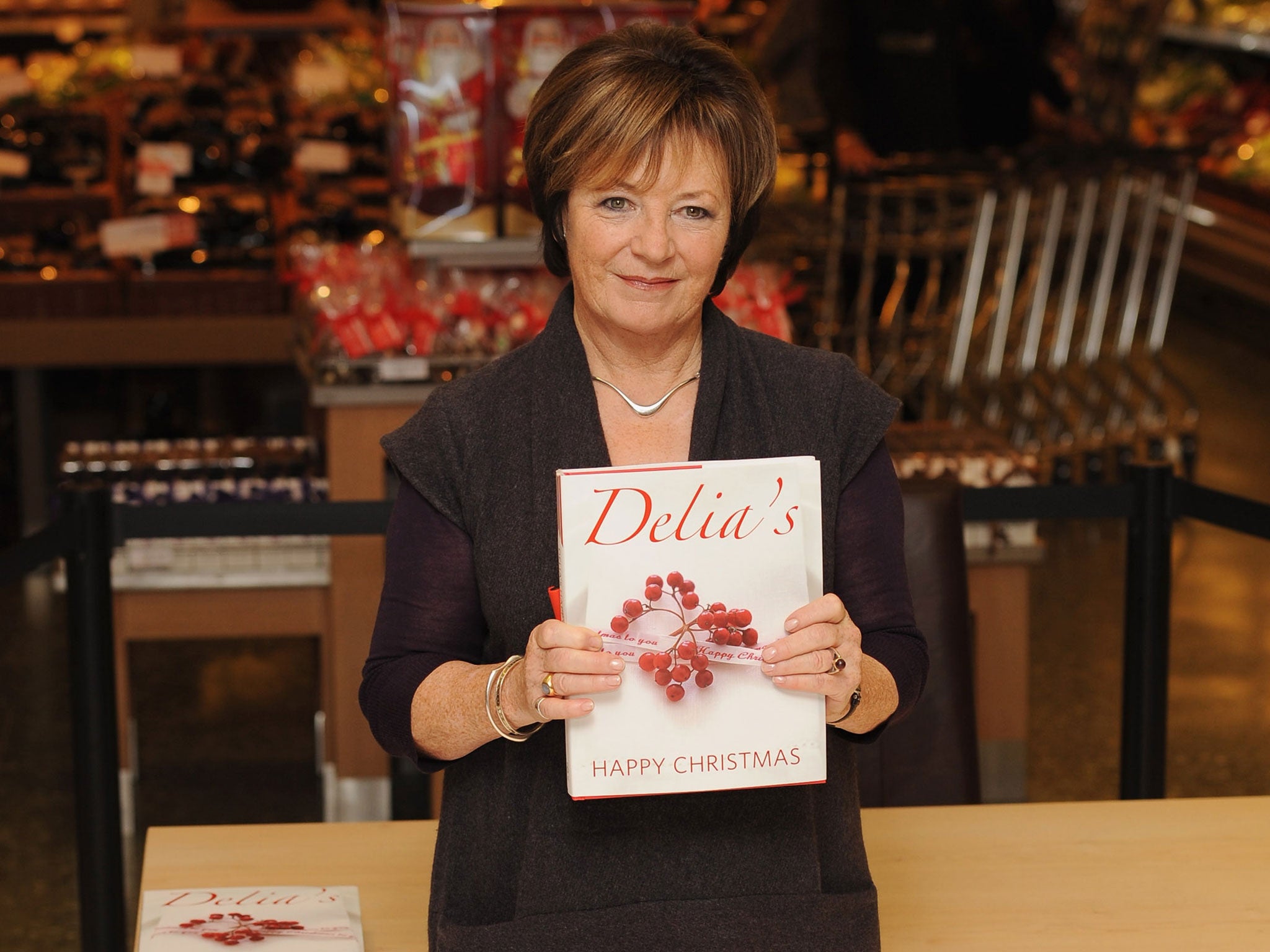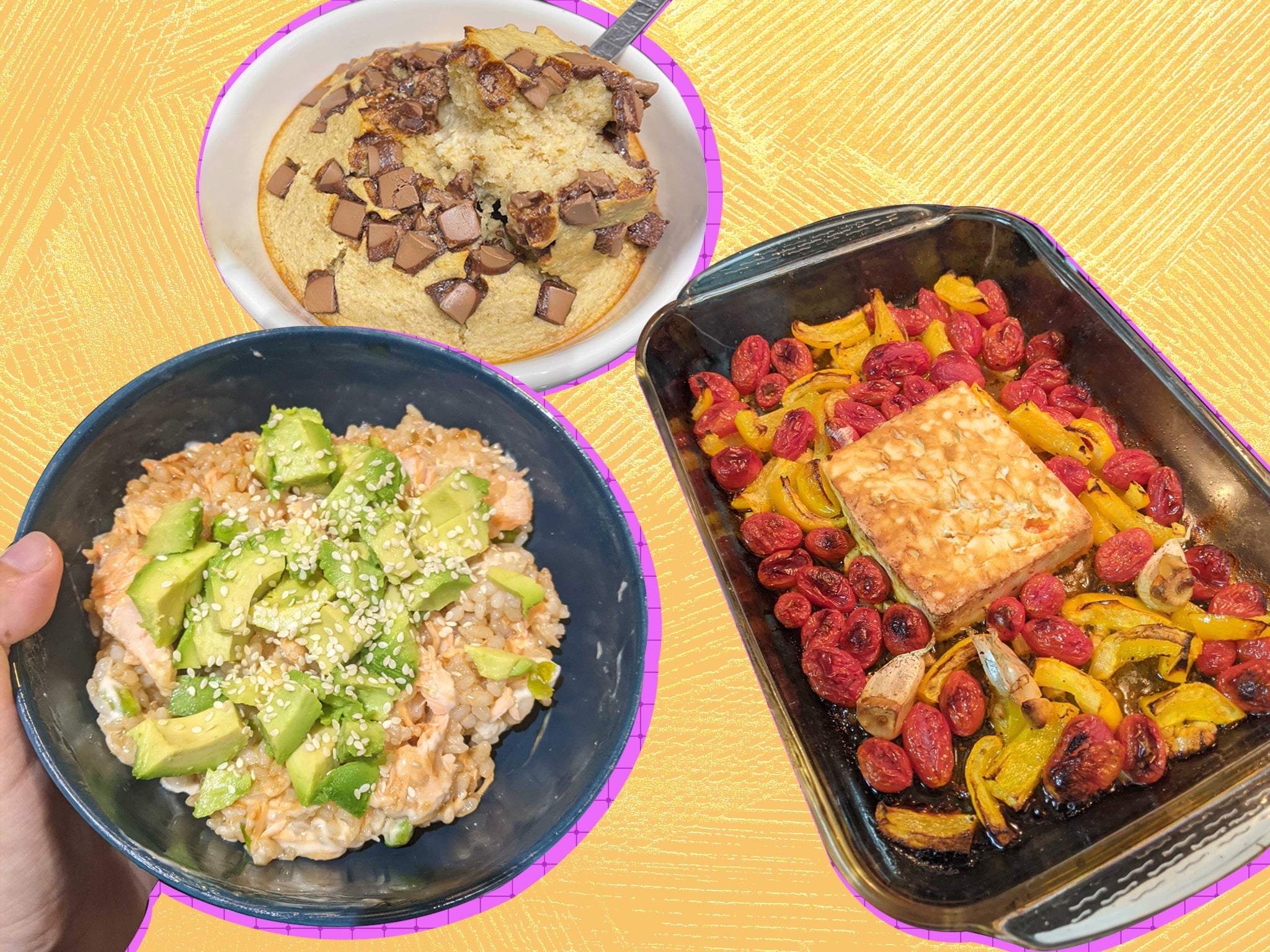The Independent's journalism is supported by our readers. When you purchase through links on our site, we may earn commission.
My generation needs our own Delia Smith – we’ve all forgotten how to cook
The beloved food writer and TV personality taught millions how to nail the art of home cooking. But somewhere between Uber Eats, microwave meals and TikTok recipes, we’ve lost our way, argues Helen Coffey


TikTok’s viral cucumber salad recipe sends couple to hospital.” Could any headline more aptly sum up the skills vacuum that haunts an entire generation when it comes to cooking?
The recipe in question involved slicing up a cucumber and adding some flavour by way of sauce and spice – to even call it “cooking” would be somewhat of a stretch – and the influencer couple in question ended up in hospital because the man used a mandoline to do the slicing. Suffice to say he wasn’t as careful as he should have been. (Fear not, the pair were back to making social media videos the second they’d returned from A&E to reattach the tip of his finger.)
It’s not the only indication that all is not well in the kitchen. Delia Smith, Britain’s OG doyenne of home cooking, said in a recent Times interview that she “feel[s] sorry that a lot of young people don’t know what a good pork chop is like”, and that she “can’t bear” to watch modern cooking shows. To her, Nigella Lawson and Jamie Oliver represent “the last of the last army” of proper recipe writers for home cooks. She didn’t come right out and say that young people have lost their way – but there seemed a suggestion that times have changed. And not necessarily for the better.
The 83-year-old knows more than a little something about the business of food. Her Complete Cookery Course book, published in 1989, revolutionised home cooking, teaching several generations how to make delicious meals for the first time with precise, step-by-step instructions. She followed it with hit after hit, as well as presenting hugely popular cooking shows like Delia’s How to Cook. Dubbed the “Delia Effect”, her recommendation of certain products or ingredients at the height of her fame was credited with prompting an instant increase in their sales.
If, like me, you were born in the Eighties, chances were your parents had at least one Delia volume on the shelf. And, unlike other recipe tomes from fancy chefs making bafflingly highfalutin’ fare, her books actually got used. There wasn’t a single dinner party in our household that wasn’t underpinned by her classic dishes (shout-out to her marsala-baked peaches with mascarpone cream); not a Christmas goes by to this day without Smith unknowingly at the helm, thanks to my mum’s well-worn copy of Delia Smith’s Christmas (the dark green cover with a red ribbon making it feel like a perennial present, just dying to be opened).
Smith’s significant book sales speak to her huge mainstream appeal: in a recent top 100 to mark 50 years of the Sunday Times bestseller list, Delia Smith’s Complete Cookery Course came in third place, having spent 225 weeks in the chart. Delia’s Summer Collection is at number seven (183 weeks), and her Complete Illustrated Cookery Course sits in 15th place (148 weeks).
“I wasn’t entertaining,” Smith has said. “I was just about teaching you how to cook – this boring lady explaining step by step. I was like a Volvo, reliable but not very exciting.”

But a Volvo is exactly what you need when learning something as fundamental as cooking – and it’s exactly what we no longer have. Millennials and Gen Z grew up without any real cookery teaching at school thanks to Margaret Thatcher removing it from the curriculum. We instead got lumped with “food tech”, a completely useless subject in which the only “cooking” we ever did consisted of fruit salads and add-your-own pizza toppings. How to chop an onion, make a simple sauce or just produce one straightforward meal wasn’t deemed worthy of our time or attention.
Today, we’re surrounded by “entertainment” and “excitement” when it comes to food – the equivalent of flashy sports cars, to use Smith’s original analogy. There’s more “content” than ever, instantly accessible at the touch of a button or scroll of a screen, and a new TikTok recipe trends every week. None of it rewards patience; much of it consists of “hacks” to make any kitchen task quicker rather than tastier. The sheer amount of choice is overwhelming. It’s a long way from the simplicity of the Delia age, in which you had a handful of good cookbooks, filled with good recipes, that worked well every time.
We’re now in an era of style over substance designed to beguile the algorithm more than the palate
Then there’s the lack of quality control. There is no way of knowing at a glance which of these endless, beautiful-looking videos actually deliver the goods and which are merely content for content’s sake, made to be watched and drooled over rather than reproduced at home. Remember the insanely overhyped viral TikTok feta pasta, consisting of a block of cheese drenched in olive oil and shoved in the oven with some tomatoes? It’s almost the antithesis of what Smith stood for in the latter part of the last century: we’re now in an era of style over substance designed to beguile the algorithm more than the palate.
The rampant uptick in convenience foods like microwave meals, meal replacement drinks such as Huel and delivered-to-your-door recipe kits like Hello Fresh and Gusto is another example of how we’ve grown to value convenience over all else. Services like UberEats, Deliveroo and Just Eat, meanwhile, have tempted us further away from upping our cooking game; it’s become easier than ever to let laziness take the wheel. “Takeaway?”, you weakly ask your partner, and three taps later your meal is on its way, eye-wateringly expensive and lukewarm by the time it arrives.

These services, somewhat ironically, were propelled to popularity during the Covid lockdowns. Ironically, because it was also the one and only time many people my age really got into cooking. With nothing but time and nowhere to be, I became genuinely excited rifling through recipe books, planning meals I’d never tried, waltzing the supermarket aisles during the weekly shop, heading home and turning the words on the page into a reality on my plate.
Once some pandemic restrictions lifted, a flurry of dinner party invitations ensued – small, intimate evenings round friends’ houses, filled with warmth and laughter and gorgeous home-cooked fare. Or Sunday roasts with all the trimmings, bringing back a potent dose of nostalgia thanks to a childhood steeped in this weekly ritual that had somehow fallen by the wayside. But as soon as life returned to normal, it all seemed to stop. Houses were swapped for restaurants. Roasts were once again relegated to a table booked at the nearest gastropub, costing a minimum of £20 a head and featuring distressingly pale and al dente potatoes.
It feels like somewhere along the way we not only forgot how to cook, but why we cook: the inherent joy in offering hospitality to others; the pride and pleasure that comes from doing something yourself rather than throwing money at the problem; the stripped-back sweetness of creating a meal from scratch using ingredients that make your body feel good.
The next gen is crying out to be inspired by its very own version of Delia Smith. Forget fast cars – the UK needs another cookery Volvo, pronto.

Join our commenting forum
Join thought-provoking conversations, follow other Independent readers and see their replies
Comments